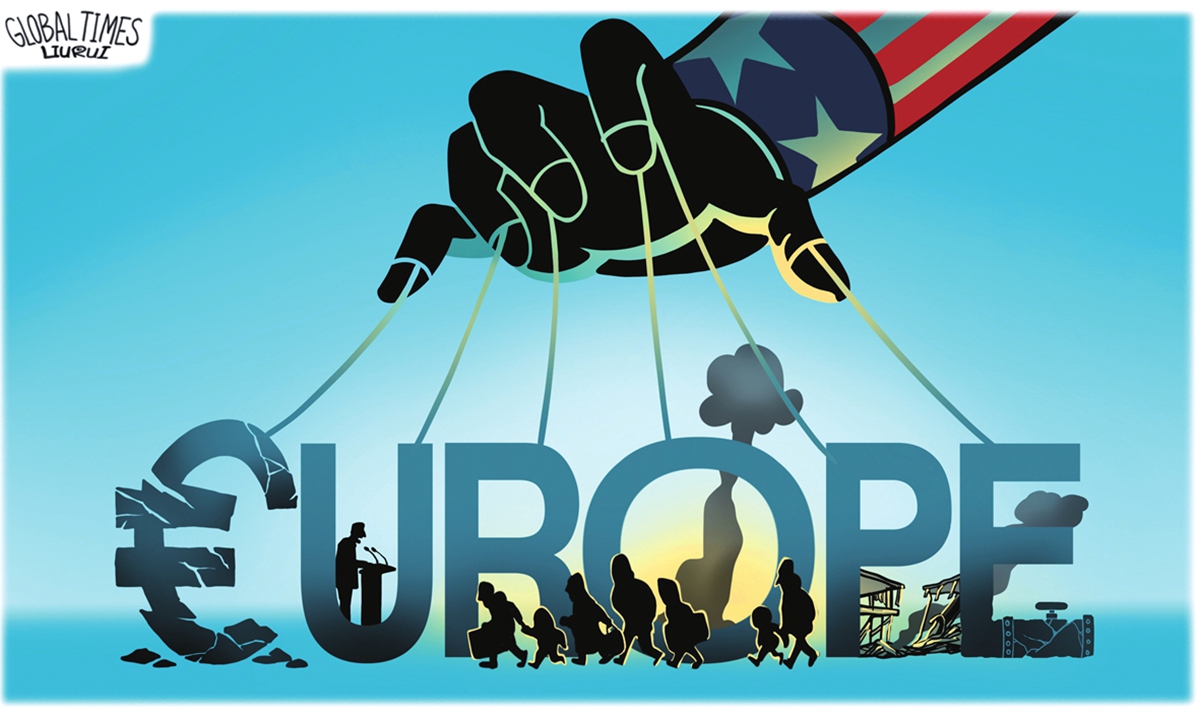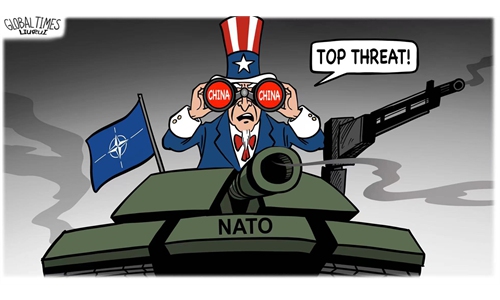
Illustration: Liu Rui/GT
US President Joe Biden will visit the United Kingdom, Lithuania and Finland from Sunday to Thursday as a major new move by the US to try and tie European countries to its geopolitical chariot. Biden has an important agenda on his Europe trip, including the NATO summit in Vilnius, Lithuania, and the US-Nordic Leaders Summit in Helsinki, Finland.In fact, the three countries that Biden will visit are all those that, in recent years, have strived to move closer to the US' strategic direction. For example, the UK has been bent on injecting politicized, security-oriented and ideological elements into its relations with China. Lithuania insists on its logic of "standing against China - becoming closer to the US - promoting anti-Russian sentiment, challenging China's core interests on the Taiwan question and undermining pragmatic cooperation between China and Central and Eastern Europe. Finland gave up its neutrality to join NATO after Russia-Ukraine conflict and has rushed to the front line of military containment of Russia.
For the time being, the European Union (EU) and some European countries have shown a tendency to "Japanize" their policies toward the US. It has become more dependent on the US in economic, military, and political fields. It has become more consciously aligned with the US regarding bloc politics, even becoming a forerunner in confronting its bloc's strategic rivals at the regional level. Judging from Japan's foreign policy in recent years, this is exactly what the country has been doing.
For instance, the EU first proposed the concept of "de-risking" and released its first economic security strategy, intensifying the politicized and securitized narrative in the economic and scientific fields. The Netherlands, along with Japan, is participating in the US-led coalition to block China from accessing advanced semiconductor manufacturing technology. The EU has also imposed 11 rounds of sanctions on Russia and provided Ukraine over $13 billion in military aid.
Thus, it seems that the EU has, consciously or not, become a cat's paw of the US hegemony and seriously harmed its own interests in various aspects. Economically, the EU is one of the worst hit regions by the Ukraine crisis and its consequences. It faces persistent inflation and energy problems, and many Europeans are struggling with unseen challenges of rising costs of living.
According to recent data, the euro zone and the EU have both experienced a 0.1 percent quarter-on-quarter contraction in the fourth quarter of 2022. The quarter-on-quarter growth in the first quarter of 2023 is also only 0.1 percent and 0.2 percent, respectively. Germany has even experienced a quarterly recession. At the same time, the EU's own industrial competitiveness, especially in the manufacturing sector, is facing a severe sustainability crisis. Many industries, especially energy-intensive ones, are facing permanent closures. The US Inflation Reduction Act has further undermined employment opportunities and industrial investment in Europe.
Recently, the German Economic Research Institute released a research report stating that the net outflow of foreign direct investment (FDI) from Germany in 2022 reached a record high of 125 billion euros, the highest ever. At the same time, the EU's decoupling from Russian energy and increased dependence on US security due to the Ukraine crisis have led to the EU's continuous expansion of purchases of US liquefied natural gas and military equipment, posing greater and more significant challenges to its trade structure and fiscal situation.
In this context, the EU's own international economic strength is likely to further exacerbate the trend of decline. In 2008, the total GDP of the EU surpassed that of the US, while the total GDP of the US was higher than that of the EU in 2022. The EU's disadvantages in the digital economy, semiconductors, and energy costs are further eroding its competitiveness. Meanwhile, the weakening of the EU economy also weakens the international influence of its common currency. The usage rate of the euro in The Society for Worldwide Interbank Financial Telecommunication (SWIFT) international payment system has been declining in recent months, reaching its lowest level in three years in April this year with a gap of 11 percentage points compared to the US dollar. In 2012, 45 percent of transactions were settled in euros, while the US dollar accounted for less than 30 percent. Considering that the EU has been hit by consecutive crises such as the euro zone debt crisis, Brexit, and the COVID-19 pandemic, it is difficult to expect strong positive momentum to support the future development trend of the euro.
Japan has experienced a "Lost 30 Years" by playing a full-fledged subordinate to the dominant US system, which eventually backfired economically. Just like Japan's historical experience, the EU is still following geopolitical and great power games at the expense of its own economic interests.
The author is a research fellow with the Institute of European Studies, China Institutes of Contemporary International Relations. opinion@globaltimes.com.cn

